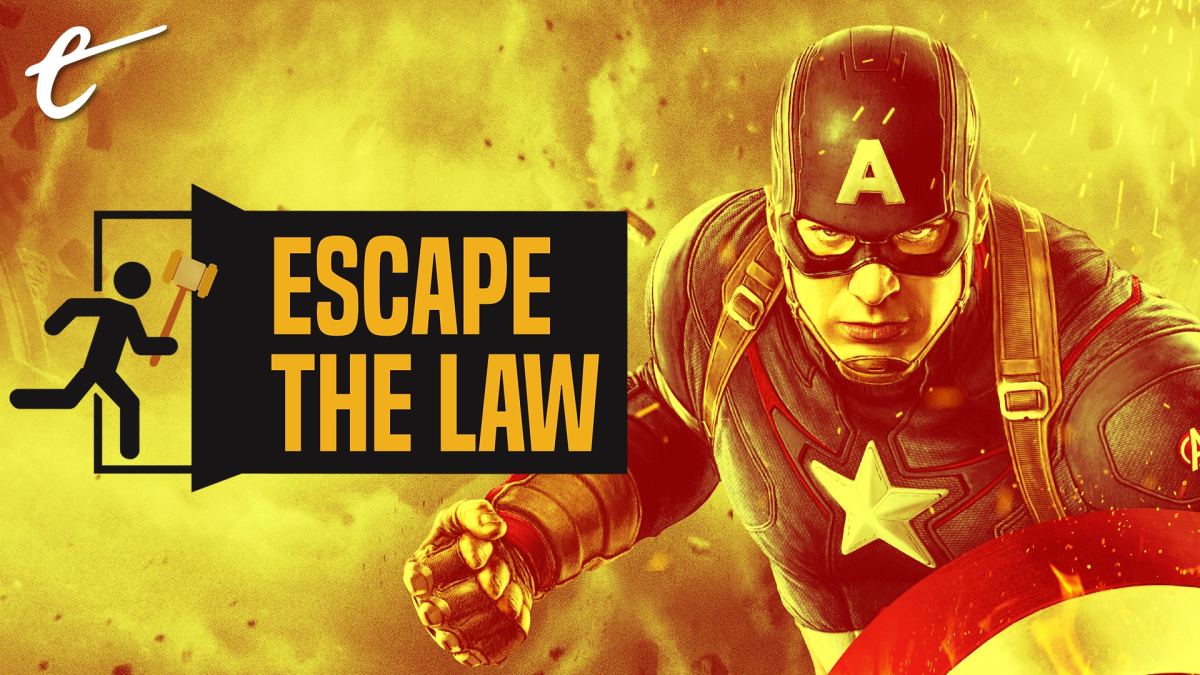The first two episodes of The Falcon and the Winter Soldier show the debut of John Walker, who was introduced to viewers as “the next Captain America.” This came as a surprise to the titular Falcon (aka Sam Wilson) who retired the “Captain America” mantle — seemingly at the government’s request — to honor Steve Rogers. To emphasize the point, Falcon donates Cap’s iconic vibranium shield to the Smithsonian.
John Walker can best be described as the “Lester and Eliza” version of Steve Rogers and unfitting of his title. Is there anything Falcon can do to reclaim the title or, barring that, stop John Walker from sullying the “Captain America” name?
Sort of. Unsurprisingly, there are a lot of factors that go into the identity of Captain America. For the purposes of this article, we can break it down into three parts: the title, the shield, and the symbol.
In short, Falcon won’t have much luck in preventing the government from using the Captain America title but could stop Walker from using Cap’s shield. The symbol of Captain America is timeless and can’t be passed to John Walker through a simple ceremony.

The Title
There is an entire area of law dedicated to ownership of titles and designation. Trademark law allows individuals or entities to claim ownership over distinct and recognizable words, phrases, or images. The owner of a mark can prevent others from using it and is entitled to money damages if someone uses a mark without permission.
The “Captain America” title would absolutely be eligible for trademark protection. The name is distinct and recognizable, has generated a substantial amount of goodwill, and is known across the country. The name has also been used in connection with the sale of goods (though that is not strictly required for trademark eligibility). As shown in Captain America: The First Avenger, the title was first used in the 1940s to promote the sale of war bonds and other military paraphernalia (including comic books and trading cards).
The real question relates to ownership rather than eligibility. The central tenet of trademark ownership is “first in time, first in right.” This means that the first person to use a mark owns the mark. In the Marvel Cinematic Universe (MCU), the first to use the mark was the federal government (probably through the military). That should settle it, right? Not quite. Trademarks do not last forever. Trademark protections only last for as long as the mark is used. If a mark is abandoned, or if it loses its significance in the eyes of the public, then the mark can be used freely by anyone until ownership of the mark is reestablished.
In the MCU, Captain America disappeared at the end of World War II. We don’t have much information regarding whether or how the government used the Captain America name after that disappearance. If the government continued to use the name (a near certainty), then ownership would remain with the government, and Falcon would have no legal basis to prevent the government from using the name in connection with the new Captain America. On the other hand, if the government abandoned the name, then Steve Rogers (or his estate) may have a claim to ownership based on his use of the name after he was recovered from the ice.

That conclusion, however, depends on whether Rogers was formally employed by the government while working as an Avenger. If he was, his employment agreement likely would have (and certainly should have) contained a provision transferring any ownership interest in the name to the government. Ironically, if he was formally employed by S.H.I.E.L.D., then ownership of his name may have ended up in the hands of Hydra (creating my favorite alternate explanation of Marvel’s 2017 Secret Empire storyline, in which a mind-zapped Rogers helped Hydra take over the world).
There is one additional theory under which Steve Rogers could claim ownership over the mark. The test of trademark infringement is whether one’s use of a valid trademark is “likely to confuse” consumers. The fact that two marks are the same does not necessarily mean the marks would be confusing. In particular, identical marks can coexist provided that each refers to a different category of goods.
Based on this theory, one could argue that there are two valid Captain America marks — one that belongs to the military and is associated with the sale of bonds and other propaganda, and one that belongs to Steve Rogers, based on his activities as an Avenger. Under that theory, the owner of Steve Rogers’ mark would not be able to prevent Walker from attending awkward high-step marching band galas or delivering Captain America rally speeches, but they would be free to use the mark in association with the Avengers and to prevent Walker from doing the same. This theory is admittedly a stretch since the respective fields of use are not entirely distinct and would still lead to consumer confusion.
Three final notes before we move on: First, for purposes of this analysis, I assume that Steve Rogers transferred whatever ownership interest he had in the mark to Falcon. Obviously, Falcon has no rights to the mark on his own. Second, trademark law does not purport to tell the military what titles it can and cannot provide to its soldiers. If the military wants to create a “Captain America” designation, it probably can. My analysis here relates to whether the government can market and promote that title in non-military contexts.

Third, suits against the government are normally barred by the doctrine of sovereign immunity. If that applied here, then Falcon would be out of luck regardless of whether he technically owned the trademark. Fortunately, the government waived its sovereign immunity for trademark infringement in the Trademark Amendments Act of 1999. For what it’s worth, states still have immunity and so can violate trademarks and copyrights freely without penalty.
All told, Falcon has a few legal theories he could use to try to stop the military and John Walker from using the Captain America name, but most of those attempts end in failure.
The Shield
Whether John Walker can use Cap’s shield is much easier to resolve. At the end of Avengers: Endgame, Captain America gave his shield to Falcon. Falcon then donated or loaned the shield to the Smithsonian so that future generations could appreciate Steve Rogers’ legacy. The Smithsonian then violated that agreement and gave the shield to the military to be used by the new Captain America.
In almost every realistic scenario, the Smithsonian would have breached its contract with Falcon, and Falcon could almost certainly require the government to return the shield. The easiest scenario would be if he loaned the shield to the Smithsonian. In that case, it would not have had the authority to give the shield to anyone else. Even if Falcon relinquished his ownership in the shield, he could still reclaim it on the grounds that his donation was based on a false promise or act of fraud. It is illegal to procure a donation on false pretenses. Thus, Falcon would be able to annul his donation and get the shield back.

This does not mean that the military would be unable to procure the shield. It could still use eminent domain to take the shield or pass legislation or regulation prohibiting the private possession of vibranium. If I were Falcon’s lawyer (a guy can dream), I would invite Wakanda to claim ownership over the shield to prevent an eminent domain-style taking. This claim is plausible, since Wakanda provided the shield in the first place (maybe).
The Symbol
There are some people who are so influential that they transcend titles and become symbols. Genghis Khan, Julius Caesar, and Abraham Lincoln were known as khan, emperor, and president — but those titles meant nothing in comparison to the role they played in the course of history. Julius Caesar was so influential that his name became a title of its own. All three were followed by successors who shared their titles but have since been relegated to historical footnotes or epilogues in the biographies of greater men.
The same is true with Steve Rogers — the only mortal worthy enough to wield Thor’s hammer, the man out of time, the soldier who jumped on a grenade (without a fancy helmet). John Walker may have the shield, the uniform, and the name, but he is not the Captain America and never will be. At most, one could say that the mantle of Captain America is aspirational — something to remind us of an ideal we can strive for, but in all likelihood can never obtain.
In this sense, focusing on the title itself distracts from the more important question — what can Falcon (or John Walker) do to live up to the ideals of Captain America? Even Steve Rogers knew that the title was a secondary consideration, which is why he abandoned the title for years after growing disillusioned with what America had become.
Thus, we see that it’s not the title that makes the man, but the man that makes the title. All that’s left now is to hope that Falcon, Walker, and the Winter Soldier can reach the same conclusion.





